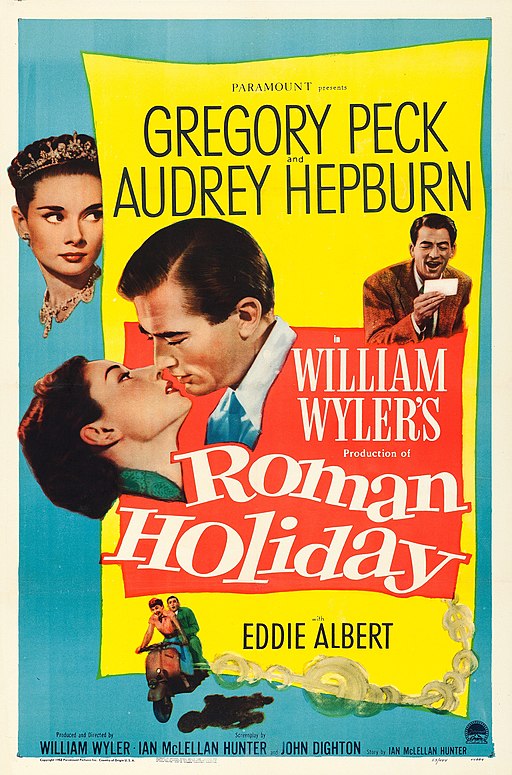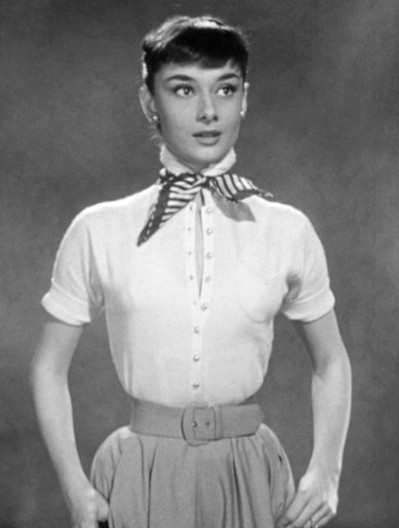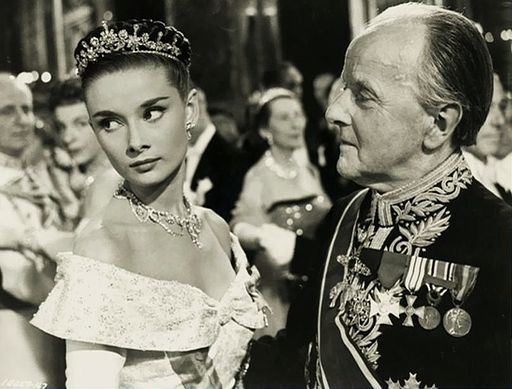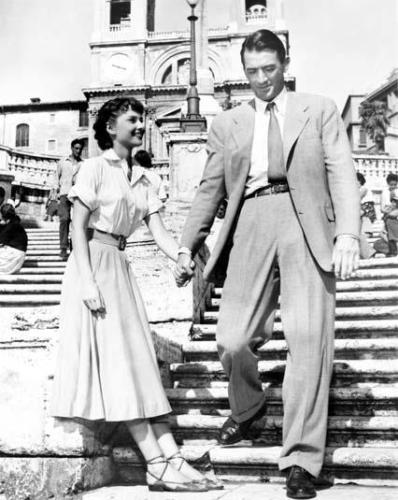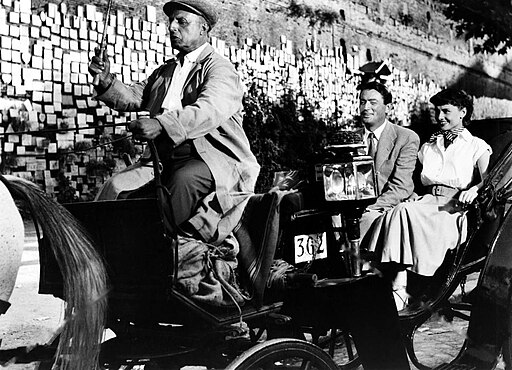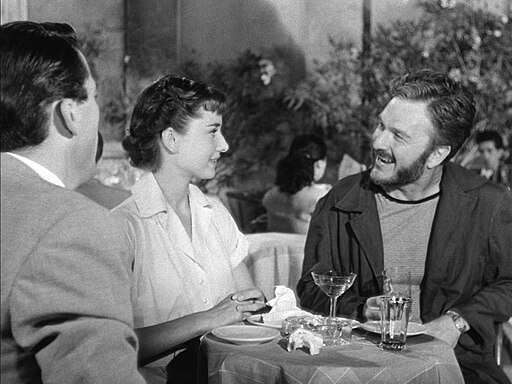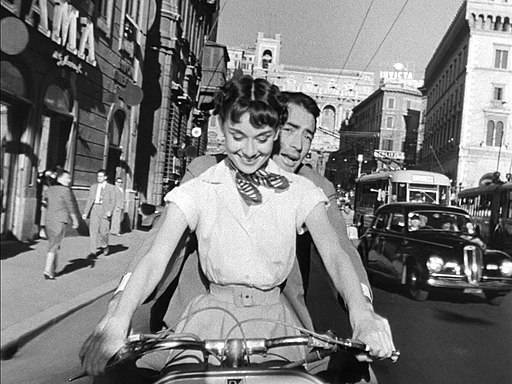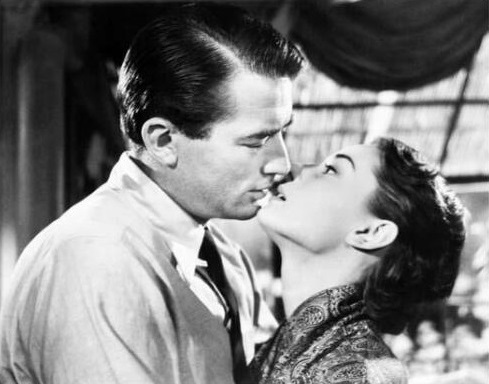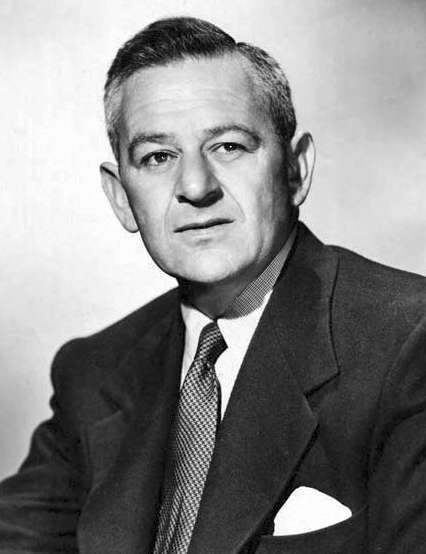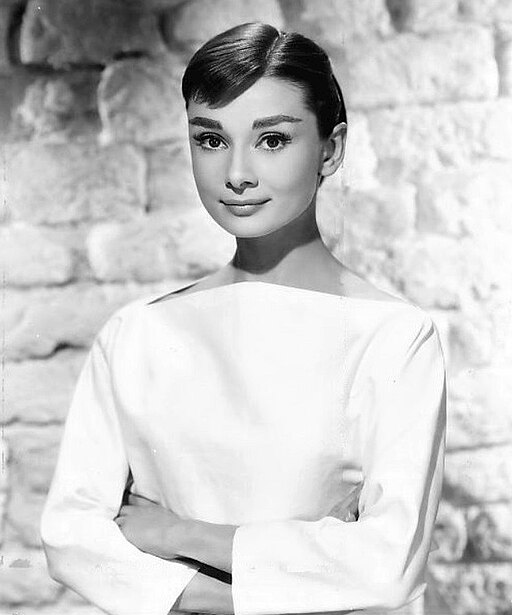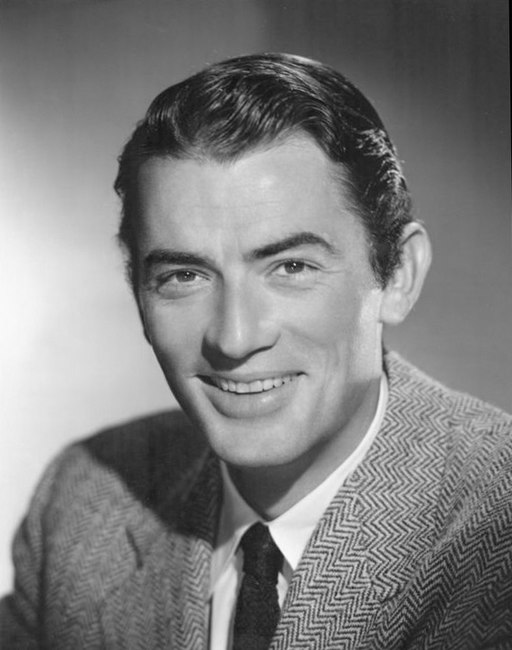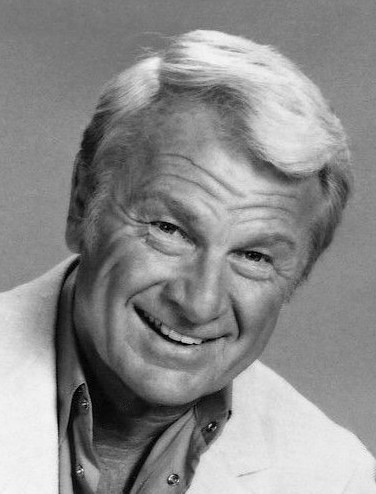Roman Holiday - 1953
back| Released by | Paramount Pictures |
| Director | William Wyler |
| Producer | William Wyler |
| Script | Story by Dalton Trumbo - Screenplay by Ian McLellan Hunter and John Dighton |
| Cinematography | Franz Planer and Henri Alekan |
| Music by | Georges Auric |
| Running time | 118 minutes |
| Film budget | $1.5 million |
| Box office sales | $12 million |
| Main cast | Audrey Hepburn - Gregory Peck - Eddie Albert |
Roman Holiday
A Timeless Romantic Adventure through the Heart of Rome
"Roman Holiday" is notable for being Audrey Hepburn's breakthrough role, for which she won the Academy Award for Best Actress.
The film combines elements of romantic comedy, drama, and adventure, set against the picturesque backdrop of Rome. Its story follows a royal princess who, overwhelmed by her suffocating schedule, escapes her guardians and falls in love with an American newsman in Rome.
The film is celebrated for its charming script, outstanding performances, and the enchanting chemistry between Hepburn and Peck.
Related
Roman Holiday – 1953
"Roman Holiday" is a classic romantic comedy film released in 1953, directed by William Wyler. The film is set in Rome and stars Audrey Hepburn, Gregory Peck, and Eddie Albert.
Summary:
The story revolves around Princess Ann (Audrey Hepburn), a young and sheltered royal on a European tour. Frustrated and exhausted by her tightly scheduled life, she rebels against her royal obligations. One night in Rome, she secretly escapes her country's embassy.
Joe Bradley (Gregory Peck), an American reporter living in Rome, encounters her asleep on a public bench. Unaware of her identity, he offers her shelter for the night at his apartment. The next morning, Joe realizes who she is and sees an opportunity for an exclusive story. He pretends ignorance of her true identity, offering to show her Rome.
The movie then follows the princess and the reporter as they explore Rome together. Despite being a scheming journalist initially, Joe finds himself genuinely falling for Ann. They share a series of adventures, including a memorable scooter ride, a dance on a riverboat, and a run-in with the secret police. These experiences liberate Ann from her royal constraints, allowing her to experience life as an ordinary person.
The character of Irving Radovich (Eddie Albert), a photographer and friend of Joe, adds humor and intrigue as he covertly photographs Ann's escapades.
Analysis:
"Roman Holiday" is a poignant exploration of freedom, responsibility, and the bittersweet nature of love. It juxtaposes the confinements of royalty with the liberating experiences of everyday life. The film is also a fascinating commentary on the roles and expectations of women in the 1950s, as Princess Ann struggles against the constraints of her royal duties.
Audrey Hepburn’s portrayal of Princess Ann is both charming and emotionally resonant, capturing the essence of a young woman caught between duty and desire. Her performance, combining innocence with a longing for independence, won her an Academy Award.
Gregory Peck's portrayal of Joe Bradley is equally significant. His character's ethical dilemma and eventual decision not to exploit Ann's story for personal gain is a testament to the film's underlying moral integrity.
The chemistry between Hepburn and Peck is one of the film's highlights, offering a blend of romance, comedy, and drama. The ending, which is neither a conventional happy ending nor a tragic one, adds to the film's depth. It's a poignant conclusion that respects the characters' personal growth and responsibilities.
The backdrop of Rome plays a crucial role in the film, with its historic and picturesque settings providing a perfect stage for the unfolding romance. The film serves as a beautiful visual tour of the city, from the Mouth of Truth to the Spanish Steps.
Classic 1953 Trailer of Roman Holiday:
Full Cast of Roman Holiday:
- Audrey Hepburn as Princess Ann
- Gregory Peck as Joe Bradley
- Eddie Albert as Irving Radovich
- Hartley Power as Mr. Hennessy
- Harcourt Williams as the Ambassador
- Margaret Rawlings as Countess Vereberg
- Tullio Carminati as General Provno
- Paolo Carlini as Mario Delani
- Claudio Ermelli as Giovanni
- Paola Borboni as the Charwoman
- Alfredo Rizzo as Taxi Driver
- Laura Solari as Secretary
- Gorella Gori as Shoe Seller's Wife
- Heinz Hindrich as Doctor Bonnachoven
- Gianna Segale as Schoolgirl
- Gildo Bocci as Flower Seller
- Sig. Arcalli as the Barber
- Dianora Veiga as Dancing Companion
- Tania Weber as Francesca, the Nightclub Stripper
- Giuliano Raffaelli as the Master of Ceremonies
Analysis of William Wyler’s Direction:
William Wyler's direction in "Roman Holiday" is a masterful blend of storytelling, character development, and visual composition, all of which contribute to the film's enduring charm and appeal.
Narrative Pacing and Structure: Wyler's control over the film's pacing is exceptional. He skillfully balances moments of high-energy (like the iconic scooter ride through Rome) with quieter, more introspective scenes. This pacing allows the audience to become deeply invested in the characters' emotional journeys. Wyler's direction ensures that the story unfolds organically, with each scene seamlessly leading into the next.
Character Development: One of Wyler's key strengths in "Roman Holiday" is his focus on character development. He allows the characters, particularly Princess Ann and Joe Bradley, to evolve naturally throughout the film. Wyler gives Audrey Hepburn and Gregory Peck the space to bring depth and nuance to their roles, resulting in performances that are both believable and deeply engaging. The transformation of Princess Ann from a sheltered royal to a woman discovering her own independence is portrayed with sensitivity and realism.
Visual Style and Composition: Wyler's use of Rome's landscape is another highlight of his direction. He turns the city into a character in its own right, capturing its beauty and history in a way that complements the film's narrative. Wyler's framing of scenes, his use of wide shots, and his ability to capture the essence of Rome's streets and landmarks, contribute significantly to the film's romantic and adventurous atmosphere.
Collaboration with Cinematographers: Collaborating with cinematographers Franz Planer and Henri Alekan, Wyler ensures that each shot is not just visually appealing but also meaningful in the context of the story. The choice of shooting locations, the angles, and the lighting all work together to create a visually stunning and emotionally resonant film.
Handling of Romantic Comedy Genre: In "Roman Holiday," Wyler demonstrates his adeptness at handling the romantic comedy genre. He strikes a perfect balance between romance, humor, and drama, ensuring that none overshadows the others. His direction brings out the comedic elements without detracting from the film's emotional depth.
Stellar Performance of Audrey Hepburn:
Audrey Hepburn's performance in "Roman Holiday" is a defining moment in her career and a standout in film history. Her portrayal of Princess Ann is a masterful blend of vulnerability, charm, and grace, making it a memorable and endearing character.
Vulnerability and Innocence: One of the most striking aspects of Hepburn's performance is her ability to convey the vulnerability and innocence of Princess Ann. Despite being a royal figure, she imbues her character with a relatable sense of confinement and longing for freedom. Hepburn's expressive eyes and subtle facial expressions perfectly capture Ann's inner turmoil and desire for a life beyond the palace walls. This vulnerability makes her character immediately sympathetic and engaging.
Transformation and Range: Hepburn showcases a remarkable range as she navigates Princess Ann's transformation throughout the film. She begins as a sheltered, naive young woman, burdened by her royal duties. As the story progresses, Hepburn effectively portrays Ann's awakening to the joys and challenges of ordinary life. Her performance in scenes exploring Rome, whether marveling at the city's beauty or enjoying simple pleasures like a haircut, is filled with a sense of wonder and discovery.
Chemistry with Co-stars: Hepburn's chemistry with Gregory Peck (Joe Bradley) is another highlight. She strikes a perfect balance between romance and camaraderie, making their relationship both believable and captivating. Her interactions with Eddie Albert (Irving Radovich) add a layer of humor and lightness to the film.
Elegance and Comedic Timing: Audrey Hepburn's elegance is ever-present, but she also displays a natural talent for comedy. Her impeccable timing and ability to deliver lines with a mix of earnestness and wit contribute significantly to the film's charm. The scene at the Mouth of Truth, where she playfully pretends to have her hand bitten off, showcases her ability to blend humor with charm seamlessly.
Emotional Depth: Perhaps the most powerful aspect of Hepburn's performance is her conveyance of deep emotion, particularly in the film's final scenes. The conflict between her duty as a princess and her personal desires is portrayed with poignant subtlety. Hepburn's farewell to Joe Bradley is a masterclass in understated emotion, conveying a profound sense of loss and love without the need for dramatic outbursts.
Conclusion: Audrey Hepburn's performance in "Roman Holiday" is a testament to her immense talent and versatility as an actress. She brings depth, nuance, and a genuine sense of humanity to Princess Ann. This role not only earned Hepburn an Academy Award but also solidified her status as a major film star and a timeless icon of elegance and charm. Her portrayal in "Roman Holiday" remains a benchmark for actors in romantic comedies and a beloved performance in cinematic history.
Blacklisted Dalton Trumbo makes the Difference:
Dalton Trumbo's script for "Roman Holiday" is a significant and intriguing piece of film history, not only for its content but also for the circumstances surrounding its creation.
The Script: Trumbo's script for "Roman Holiday" is celebrated for its charming and witty narrative. It tells the story of a bored and sheltered princess who escapes her guardians and falls in love with an American journalist in Rome. The screenplay skillfully blends elements of romance, comedy, and adventure, creating a story that is both heartwarming and humorous. Trumbo's writing is notable for its sharp dialogue, well-developed characters, and its ability to capture the magic of Rome.
Blacklisting and Fronting: Dalton Trumbo, one of the Hollywood Ten, was blacklisted by the film industry during the McCarthy era due to his alleged Communist affiliations. Because of this, he was unable to work openly in Hollywood. For "Roman Holiday," Trumbo wrote the script under the pseudonym Ian McLellan Hunter, a friend and fellow writer who acted as his front.
Posthumous Recognition: The credit for the story of "Roman Holiday" was originally given to Hunter. It wasn't until 1992, long after Trumbo's death, that the Academy officially recognized Trumbo's contribution. In 1993, Trumbo was posthumously awarded the Oscar for Best Story, and his widow received the statuette on his behalf. This correction was a significant moment in acknowledging the injustices faced by many during the Hollywood blacklist era.
Legacy: Dalton Trumbo's script for "Roman Holiday" has left a lasting impact on the film industry. It's not just a testament to his talent as a writer, but also a symbol of resilience and integrity in the face of political oppression. The story behind the script is as compelling as the script itself, highlighting a tumultuous period in Hollywood's history and the enduring power of storytelling.
Memorable Quotes from the Movie:
- Joe Bradley: "Rome. By all means, Rome. I will cherish my visit here in memory as long as I live."
- Princess Ann: "I've never been alone with a man before, even with my dress on. With my dress off, it's most unusual."
- Princess Ann: "Is this the elevator?" Joe Bradley: "This is my ROOM!"
- Princess Ann (about the Mouth of Truth): "The guide book says that if you're given to lying, you put your hand in there it'll be bitten off." Joe Bradley: "Oh, a good idea for a lot of people."
- Princess Ann: "Do you have a silk nightgown with rosebuds?" Joe Bradley: "I haven't worn a nightgown in years!"
- Irving Radovich: "Everything we do is journalistic gold."
- Princess Ann: "At midnight, I'll turn into a pumpkin and drive away in my glass slipper." Joe Bradley: "And that will be the end of the fairy tale."
- Princess Ann (to Joe): "I don't know how to say goodbye. I can't think of any words." Joe Bradley: "Don't try."
- Joe Bradley: "Well, life isn't always what one likes, is it?"
- Princess Ann: "I will cherish my visit here in memory as long as I live."
Roman Holiday’s impact on the Vespa Scooter:
The Vespa scooter in "Roman Holiday" is not just a mode of transportation; it's a symbol of freedom and adventure, and it plays a pivotal role in the film. Here's what makes the Vespa scene so iconic:
Iconic Scene with the Vespa:
- One of the most memorable scenes in "Roman Holiday" is Audrey Hepburn (Princess Ann) and Gregory Peck (Joe Bradley) exploring Rome on a Vespa. This scene encapsulates the spirit of freedom and rebellion that defines Hepburn's character's journey in the film.
- The Vespa ride through the bustling streets and historic sites of Rome is both exhilarating and visually striking. It represents a departure from Princess Ann's sheltered royal life, offering her a taste of normalcy and spontaneity.
Cultural Impact:
- The Vespa scene in "Roman Holiday" had a significant cultural impact. It popularized the Vespa scooter as a symbol of style, freedom, and youth culture. Following the release of the film, Vespa sales skyrocketed, and the scooter became an icon of Italian design and culture.
- The scene helped to cement the Vespa's image in popular culture as a stylish and fun mode of transportation, ideal for exploring urban landscapes.
Symbolism:
- In the context of the film, the Vespa symbolizes freedom and the breaking away from constraints. For Princess Ann, riding the Vespa through Rome is a liberating experience, allowing her to break free from the confines of her royal duties and explore life as an ordinary person.
- The Vespa also symbolizes the developing romance between Ann and Joe. The shared experience on the scooter brings them closer, both literally and figuratively, and allows for a natural development of their relationship.
Cinematic Representation:
- The way William Wyler captures the Vespa ride is noteworthy. The cinematography during this sequence provides a dynamic and engaging view of Rome, contributing to the film's romantic and adventurous atmosphere. It's a blend of excitement, romance, and a picturesque portrayal of Rome.
In summary, the Vespa in "Roman Holiday" is more than just a scooter; it's a key element that drives the narrative forward, symbolizes the theme of freedom, and has left a lasting impact on popular culture.
Awards and Recognition:
Academy Awards (Oscars):
- Won:
- Best Actress in a Leading Role: Audrey Hepburn
- Best Costume Design, Black-and-White: Edith Head
- Best Writing, Motion Picture Story: Dalton Trumbo (awarded posthumously in 1993; originally credited to Ian McLellan Hunter, a front for Trumbo, who was blacklisted at the time)
- Nominated:
- Best Picture
- Best Director: William Wyler
- Best Supporting Actor: Eddie Albert
- Best Writing, Screenplay: Ian McLellan Hunter and John Dighton
- Best Cinematography, Black-and-White: Franz Planer and Henri Alekan
- Best Art Direction-Set Decoration, Black-and-White: Hal Pereira and Walter H. Tyler
- Best Film Editing: Robert Swink
BAFTA Awards:
- Won:
- Best British Actress: Audrey Hepburn (Note: At the time, BAFTA awarded a single category for actors/actresses in any film, whether British or foreign)
- Nominated:
- Best Film from any Source
Golden Globe Awards:
- Won:
- Best Motion Picture Actress – Drama: Audrey Hepburn
New York Film Critics Circle Awards:
- Won:
- Best Actress: Audrey Hepburn

